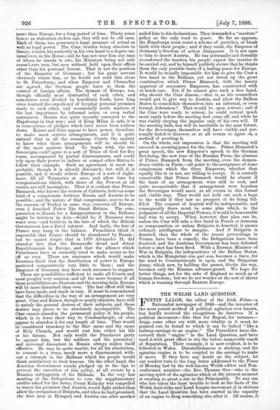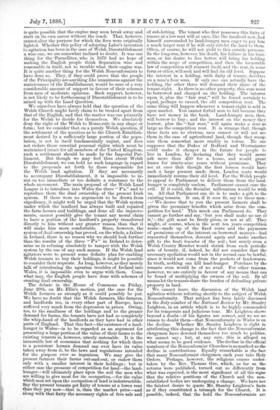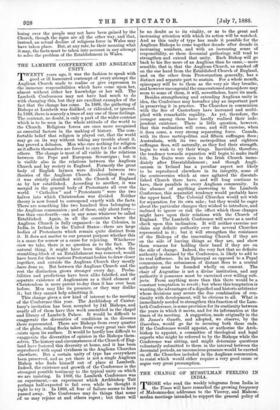THE WELSH LAND QUESTION. F INTIN LA.LOR, the editor of the
Irish Felon—a Nationalist newspaper of 1848—and. the inventor of the most potent method of political agitation ever known, has hardly received the recognition he deserves. If a political movement—like that for Repeal, for instance— drags, some other cry with more vitality in it must, he pointed out, be found to which it can be linked "like a railway-carriage to an engine." The Parnellites have dis- covered their " engine " in the Land Question, and have used it with great effect to stir the before immovable coach of Separation. Their example, it is now evident, is to be followed in Wales. Disestablishment is sticking, and the agrarian engine is to be coupled to the carriage to make it move. If they have any doubt on the subject, let our readers turn to the long letter addressed to the Times of Monday last by the well-known Welsh editor and Non- conformist minister—the Rev. Thomas Gee—who is the moving spirit of the agitation which at the present moment is creating so great a stir in the Principality. To any one who has taken the least trouble to look at the facts of the Welsh Anti-tithe and Land League movement, it is obvious that the Land Question has been started in the capacity of an engine to drag something else after it. Of course, it is quite possible that the engine may soon break away and start on its own career -without the coach. That, however, cannot alter the purpose for which the fires were originally lighted. Whether this policy of adopting Lalor's invention in agitation has been in the case of Welsh Disestablishment a wise one, we are somewhat inclined to doubt. It was one thing for the 'Parnellites, who in 1879 had no hope of making the English people think Separation wise and reasonable in itself, not to trouble what their engine was. It is quite another thing for the Welsh Nonconformists to have done so. They, if they could prove that the people of the Principality are anything like unanimous against the maintenance of the Establishment, would be sure of a very considerable amount of support in favour of their schemes from men of moderate opinions. Such support, however, is not likely to be forthcoming if Disestablishment is to be mixed up with the Land Question.
We ourselves have always held that the question of the Welsh Church might fairly claim to be treated apart from that of the English, and that the matter was one primarily for the Welsh to decide for themselves. We absolutely deny the right of the Welsh to Home-rule in any shape or form ; but we consider that on a purely Welsh question, if the settlement of the question as to the Church Establish- ment desired by a sufficiently large portion of the popu- lation, is not in itself fundamentally unjust, and does not violate those essential personal rights which must be maintained intact for all members of the United. Kingdom, such a settlement should be made by the Imperial Par- liament. But though we may feel thus about Welsh Disestablishment, we can hold no such language in regard to the proposals set forth by those responsible for the Welsh land agitation. If they are necessarily to accompany Disestablishment, it is impossible to in- sist on too immediate or too definite a resistance to the whole movement. The main proposal of the Welsh Land League is to introduce into Wales the three "F's," and to reproduce there the dual ownership of the present Irish system. If there were no arguments to be drawn from expediency, it might well be urged that the Welsh system under which the landlord has always built and repaired the farm houses and buildings, and done all the improve- ments, cannot possibly give the tenant any moral claim to have a portion of the landlord's property transferred directly to him without any greater'- reason than that it will make him more comfortable. Since, however, the system of dual ownership has proved, on the whole, a, failure in Ireland, there is no reason why we should look further than the results of the three " F's " in Ireland to deter- mine us in refusing absolutely to tamper with the Welsh system by the use of any such means. If the Welsh land. agitators were to present some definite plan for enabling Welsh tenants to buy their holdings, it might be possible to consider their requests. As long, however, as they merely talk of introducing the agrarian troubles of Ireland into Wales, it is impossible even to argue with them. Come what may, the English people have done with schemes of creating dual ownership.
The debate in the House of Commons on Friday, June 29th, on Mr. Ellis's motion, put the case for the Welsh farmers as strongly as it could possibly be put. We have no doubt that the Welsh farmers, like farmers, and landlords too, in every other part of Europe, have suffered very much from the depression in prices. Owing, too, to the smallness of the holdings and to the greater demand for farms, the tenants have not had so completely the whip-hand of the landlords as they have had. in other parts of England. That this fact—the existence of a land- hunger in Wales—is to be regarded as an argument for presenting a large portion of the value of their farms to the existing tenants is, however, utterly untenable. It is the inexorable law of economics that nothing for which there is a persistent human demand can ever have its value taken away from it, be the laws and regulations intended for the purpose ever so ingenious. We may give the present farmers their farms out-and-out, or endow them only with a smaller interest in their holdings ; but in -either case the pressure of competition for land—the land- hunger—will ultimately place upon the soil the men who are. willing to give most for its occupation,—for the value which men set upon the occupation of land is indestructible. Say the present tenants get fixity of tenure at a lower rent than they pay now—that is, than the market price—and along with that fixity the necessary rights of free sale and of sub-letting. The tenant who first possesses this fixity of tenure at a low rent will at once, like the landlord now, find himself surrounded by land-hungry men eager to pay him a much larger rent if he will only sub-let the land to them. Often, of course, he will not yield to this outside pressure. In the long-run, however, his death, his failure in his busi- ness, or his desire to live better, will bring his holding within the scope of competition, and then the inexorable law of competition will reassert itself, and the rent, in some form or other, will seek 'and will find its old level. Suppose the interest in a holding, with fixity of tenure, devolves on a man's four sons. If only one can actually have the holding, the other three will demand their share of the tenant-right. As there is no other property, this sum must be borrowed and charged on the holding. The interest upon it, plus the "fair rent," will be found certainly to equal, perhaps to exceed, the old competition rent. The same thing will happen whenever a tenant-light is sold in open market. You cannot forbid men to bid because they have not money in the bank. Land-hungry men, then. will borrow to buy ; and the interest on the money they borrow, plus the "fair rent," will again make a rent as large as the competition rent. It is strange that, though these facts are so obvious, men cannot or will not see them in the case of agricultural land, though they recog- nise them somewhat more readily in towns. No one supposes that the Dukes of Bedford and Westminster could make it cheaper in the future for people to live in London, by declaring that they would never ask more than £50 for a house, and would grant leases for ninety-nine years without premiums. They see at once that though the first lessees would have each a large present made them, London rents would immediately resume their old level. For the Welsh people to appeal to Parliament to deliver them from the land- hunger is completely useless. Parliament cannot cure the evil. If it could, the Socialist millennium would be with us. All that Parliament can do is to make a gift to the existing tenants. It can, if it sees fit, say to these men : We decree that to you the present farmers shall be given the pecuniary benefits which arise from the com- petition for land.' This much can Parliament do. They cannot go further and say, but you shall make no use of it,'—the gift must be freely given, or not at all. They might, of course, when in the next ten years competition rents—made up of the fixed rents and the payments of premiums or of the interest on borrowed moneys—had reasserted themselves, descend again and make another gift to the beati tenentes of the soil ; but surely even a Welsh County Member would shrink from such periodic acts of bounty, if, indeed, he did not consider that the necessary spoliation would not in the second case be lawful, since it would. not come from the pockets of landowners. In truth, nothing can kill land-hunger. Purchase by the tenants even would be of no avail. For other reasons, however, we are entirely in favour of any means that can be found of multiplying the owners of the soil. By all means let the tenants share the burdezi of defending private property in land.
We eannot leave the discussion of the Welsh land agitation without referring shortly to the subject of Welsh Nonconformity. That subject has been lately discussed in the July number of the National Review by Mr. Stanley Leighton, in an article which is to be highly commended for its temperate and judicious tone. Mr. Leighton shows beyond a doubt—if his figures are correct, and we see no reason to doubt-them—that Nonconformity in Wales is on the decline. Whether Mr. Stanley Leighton is right in attributin, this change to the fact that the Nonconformist clergymen have devoted themselves too much to politics, we cannot say ; but, at any rate, this is alleged on what seems to be good evidence. The decline in the official numbers of the Nonconformist Churches is as marked as the decline in contributions. Equally remarkable is the fact that many Nonconformist clergymen each year take Holy Orders. Perhaps, however, the religious census under- taken by the Rev. Thomas Gee, which, as far as the returns were published, turned out so differently from what was expected, is the most significant of all the signs that the relative positions of the Church and the non- established bodies are undergoing a change. We have not the faintest desire to quote Mr. Stanley Leighton's facts as if they constituted a triumph for the Church. It is. possible, indeed, that the hold the Nonconformists are losing over the people may not have been gained by the Church, though the signs are all the other way, and that, instead, an actual decline of religious force in Wales may have taken place. But, at any rate, be their meaning what it may, the facts must be taken into account in any attempt to solve the problem of the Establishment in Wales.




































 Previous page
Previous page